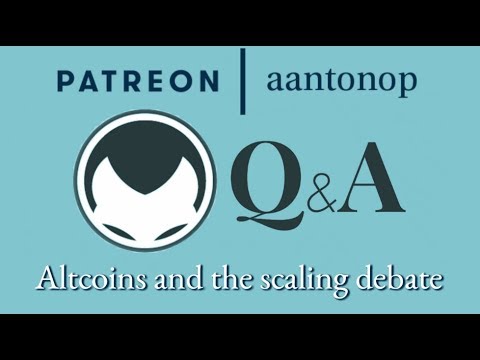Zcash and Ethereum as alternatives to Bitcoin. I’m very interested in both, I have used & run nodes for them, and experimented with the testnet. But not as “alternatives,” rather as complements to Bitcoin that specialise. My argument has been that Bitcoin and Ethereum do not compete directly. Many of the characteristics that they have chosen to differentiate in make them unable to do what Bitcoin does. Bitcoin has been doing it longer, so there is network-effect as well. In the short term, they do compete indirectly for the attention of developers and speculative investors; as a technology, they do not compete any more than a lion competes with a shark. It is about choosing platforms that fit a particular niche or purpose. Are you doing complex smart contracts that require flexibility? Ethereum. Do you want robust store-of-value without consensus failures? Bitcoin. Zcash is making trade-offs for privacy and anonymity. Conservatism vs. an attitude of ‘move fast, break things.’ You don’t reconcile them, you choose the thing that fits the niche and is adapted to that particular environment.
(3:49) Are Ethereum, Zcash, and other altcoins competing with Bitcoin because of the blocksize and scaling debate? Will Bitcoin apps and startups considering moving over high fees and the delay in implementing the Lightning Network? It is ridiculous that they are competing over this debate. Ethereum scales worse than Bitcoin, and Zcash scales worse than Ethereum. The fact that they haven’t been hit with a major scalability issue yet is because they haven’t actually scaled yet. Ethereum will do sharding? Bitcoin will do it too, and do it 10x more efficiently. The idea that you would take your application out of Bitcoin “because it isn’t scaling” and move it over to Ethereum or Zcash, which have worse scalability issues, is a bad trade-off. Scaling is not easy and there are no easy answers. Money frequently drains out of bitcoin into altcoins during times of stress, but it doesn’t last very long because they use the price increases to buy more bitcoin, and the entire market cap of the ecosystem grows overall. This allows us to test the limits of all the cryptocurrencies; they will all have governance problems that they will have to mature through to survive. The reason you’re still dry is you haven’t left the harbor yet.
This is part of a talk which took place at the Silicon Valley Bitcoin meetup on April 11th 2017 at the Plug and Play Tech Center (@PlugandPlayTC) in Sunnyvale, California: https://www.meetup.com/Silicon-Valley-Bitcoin-Users/events/233760417/
RELATED:
The Scaling Rites of Passage – https://youtu.be/rZi86_ovB3Y
Governance trade-offs in decentralised systems – https://youtu.be/dtwaW79Fj7c
Governance and the transaction fee market – https://youtu.be/gdknUUVOdHU
Why we should worry about optimization, not scaling – https://youtu.be/J3sEcuCc9fg
Do altcoins threaten to replace bitcoin? – https://youtu.be/w-V_5EWyU5c
How does Bitcoin differ from other altcoins? – https://youtu.be/37e01sJ3Tfk
The Lightning Network – https://youtu.be/vPnO9ExJ50A
Zcash in the cryptocurrency ecosystem – https://youtu.be/j8ILYfIm_G0
Andreas M. Antonopoulos is a technologist and serial entrepreneur who has become one of the most well-known and well-respected figures in bitcoin.
Follow on Twitter: @aantonop https://twitter.com/aantonop
Website: https://antonopoulos.com/
He is the author of two books: “Mastering Bitcoin,” published by O’Reilly Media and considered the best technical guide to bitcoin; “The Internet of Money,” a book about why bitcoin matters.
THE INTERNET OF MONEY, v1: https://www.amazon.co.uk/Internet-Money-collection-Andreas-Antonopoulos/dp/1537000454/ref=asap_bc?ie=UTF8
MASTERING BITCOIN: https://www.amazon.co.uk/Mastering-Bitcoin-Unlocking-Digital-Cryptocurrencies/dp/1449374042
Subscribe to the channel to learn more about Bitcoin & open blockchains!
Music: “Unbounded” by Orfan (https://www.facebook.com/Orfan/)
Outro Graphics: Phneep (http://www.phneep.com/)
Outro Art: Rock Barcellos (http://www.rockincomics.com.br/)
source











Andreas called it way before ETH had to deal with cryptokitties (and therefore scaling issues), and it didn't even take two years for it to happen!
Zcash king
Once LN is implemented bitcoin will blow scam coins blow out of the water!
Always conveying ideas and ideals to the masses. Well done ??
End of 2017 and ETH is procesing 2x times more transactions than bitcoin with fees close to nothing . So in this, he was very wrong.
How does btc not compete with alts? Of course it does. Exchanging value between two parties is the core of what the current crypto market is addressing.
Relevant now with the bcc hardfork
200k transactions per day on Ethereum sounds like they've left the harbor to me.
What he's not considering is that no species has ever been able to scale when it had issues cooperating, just look at both projects and which one is able to adapt (flexibility) and cooperate. Just based on that it's easy to see which will dominate in the long run. Bitcoin is too divided, and I don't see another outcome other than a fork with such irreconciliable differences.
Even if Ether was 100 times more difficult to scale than bitcoin, they would more like to be able to get on with it than a coin that has no leadership and direction
I think there is space for both Bitcoin and ethereum. I could be wrong, tough, annnd ther would be space only for Bitcoin.
This guy needs to relax with the cringy analogies.
TRUTH -> Cryptocurrency is advertised as decentralized and for the people, but it is really for the bank and for more control over your capital. It's like placing a chip in human but in this case, the chip is in your capitals. It's slowly migrating.
Several times I've heard you say ETH is 10x worse than BTC at scaling, but never heard an explanation of how or why. Could you please explain? Thanks!
At 5min he says "you do sharding, we'll do sharding"… this implies you can do ANYTHING to improve BTC's scaling without running into either the miners or the devs disagreeing with your approach and you find yourself in permanent deadlock… seems a bit optimistic on his part to suggest that we'll just "do sharding".
I'm new to digital assets and I'm finding Bitcoin and dash to be direct competitors, and I prefer dash at this early stage.
2017, the year BTC becomes the altcoin.
I enjoy hearing your speaking engagements. You're prepared and you give great analogies.
I like your analogy of btc being the old metal boat taking water while eth is chilling out deciding what to eat on the beach. But I have to ask…why would giant corps like Microsoft and others sign up with ethereum instead of bitcoin ? They have teams designated to make sure their companies make the right choice for their future? And they are choosing ethereum. I see bitcoin as the rebellion…the Apple of crypto the left, the libertarians and free thinkers and ethereum as more status quo right wing conservative corporate and banking manipulation in crypto. Am I wrong?
Check out Decred (DCR)! They have best decentralized governance system. Unlikely to run into these governance issues with hardfork voting on mainnet.
Does anyone else think that Andreas might be reaching a point where, because he's built his career on championing Bitcoin, he now feels that he has to try and defend it at all costs? Of course he knows more than I do, but I just don't understand how he can honestly say that Bitcoin could implement sharding 10x more effectively than Ethereum.
Can someone please explain to me in relatively straightforward terms how Ethereum would scale 10x worse than Bitcoin? I've never heard that before.
7:34 "they will all have these governance problems" meh, not decred I guess 😉
dragging on a little there about the shark and the lion hey?
Grrrrr ETH
You are the man Mr. Antonopoulos. It can be said louder but not clearer!
Buy both. Gg
What is this nonsense about Ethereum scaling 10x worse than Bitcoin? Today with no changes to either network Bitcoin can process 3 transactions per second, and Ethereum can handle 15. With the built in scaling gas limit when blocks fill up the Ethereum network can expand to at a minimum 25tx/s as demonstrated on the test network several years ago. With improvements made over the years (all though not directly tested) the maximum is most likely around 50 tx/s, on chain, today. Ethereum currently scales nearly 20x better than Bitcoin, before sharding, before Raiden. And the assumption that sharding and Lightning can be implemented on Bitcoin as soon as they are on Ethereum is fucking hilarious considering the 2+ year scaling saga we have experienced with bitcoin in which literally no progress has been made.
This is the kind of insight I would like to get more in the crypto world. How all these cryptocurrencies will evolve in the future and how their different scaling issues and governance models will perform.
Unfortunately even this explanation was too short. "Ethereum scales 10x worse." Why? Because Bitcoin "doesn't have consensus failures"?! Really, I didn't get this one. From what I know Ethereum is implementing all the main stages that were proposed (Frontier, Homestead, Metropolis, etc.), while Bitcoin is struggling with a blocksize/segwit update (which even Litecoin has now overcome).
What I invested on Bitcoin (vs Ethereum) is not only higher, but the ratio is much more than 4x (which is now their difference in terms of marketcap). I find Ethereum a great technology, but I have a lot of doubts in the perspective of an investor (it's maybe too ambitious, has infinite supply, may not work well as a currency/store of value). However, I haven't found solid information on its scalability and governance. Can anyone point me to some references? Thank you.
Excellent explanation
Good explanation Andreas. You can't compete Alts with Bitcoin and vice versa.
that lion and shark comparison
I really want to make an arena that is water halfway up and have this face off.
Good stuff Andreas! ?
Well Rootstock will enable Bitcoin to do everything that Ethereum can do but with Bitcoins massive security.
I think a better analogy would be hammer and screwdriver and which is the better tool for the job.
Antonopoulos understands the symbiotic relationship between Bitcoin and 'alts.' I think a lot of people have a hard time understanding this concept because crypto is so partisan.
Any idea about how we could solve that scalability issue without a fork ?